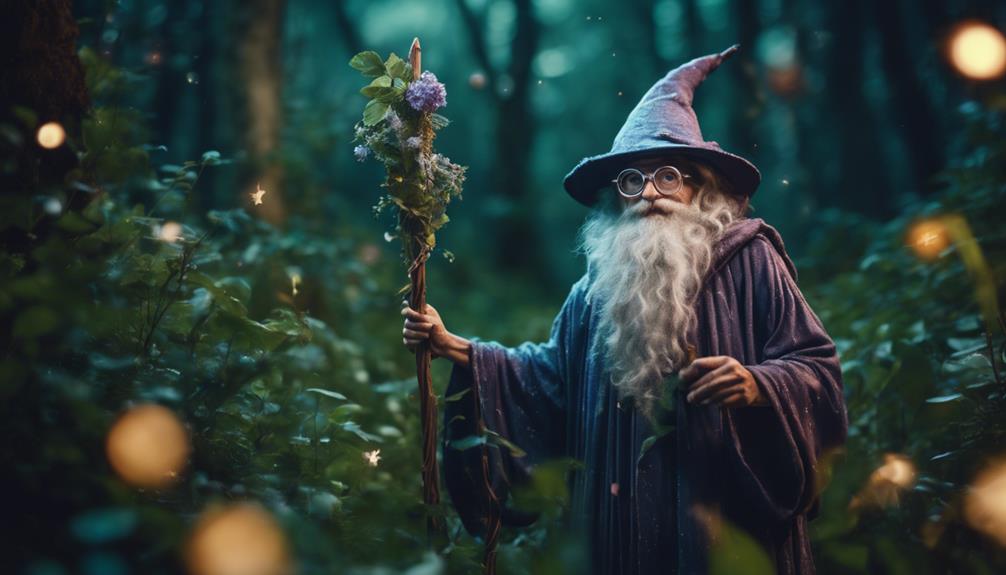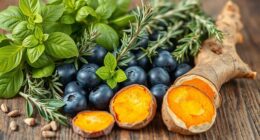Herbal myths often stem from tradition and folklore, but science can tell a different story. Many believe that herbs are completely safe because they’re natural, but some can cause adverse reactions or interact with medications. Herbs aren’t instant cures and require proper use under professional guidance. Combining herbs without knowledge can be risky. To truly understand what’s fact and what’s fiction, it’s important to explore the scientific facts behind herbal use—there’s more to uncover.
Key Takeaways
- Not all herbs are completely safe; traditional use doesn’t guarantee safety without scientific validation.
- “Natural” herbs can cause adverse reactions or drug interactions; safety depends on proper knowledge and usage.
- Herbal remedies support health over time but are not instant cures or guaranteed to work for everyone.
- Combining multiple herbs increases the risk of side effects; professional guidance helps ensure safe use.
- Consulting healthcare professionals is essential to avoid risks and understand proper, effective herbal practices.

Have you ever wondered if all herbal remedies are safe and effective? It’s a common question, especially when you hear stories about plants with supposed healing powers. Many people assume that because something is natural, it must be good for you. But that’s not always the case. It’s important to understand that herbs have medicinal properties that have been recognized and used for centuries, often through traditional uses passed down through generations. These traditional uses can offer valuable insights, but they don’t guarantee safety or effectiveness without proper scientific backing. Just because a herbal remedy has a long history doesn’t mean it’s free from risks or that it works for everyone.
Herbal remedies have a long history, but safety and effectiveness require scientific validation.
Many myths about herbs stem from misconceptions or outdated beliefs. Some folks think that herbal medicines are completely safe because they’re “natural.” While many herbs are safe when used correctly, others can cause adverse reactions or interact negatively with medications. For example, St. John’s Wort has been used traditionally to treat mild depression, and its medicinal properties are well-documented. However, it can interfere with other medications, reducing their effectiveness. This highlights the importance of understanding both the traditional uses and the scientific evidence behind herbal remedies before incorporating them into your health routine.
Another common myth is that herbal remedies can cure any ailment instantly. That’s rarely true. Herbs may support health and help manage symptoms, but they’re not magic bullets. Many traditional uses involve taking herbs over a period of time to see benefits, and results vary from person to person. Relying solely on herbs without consulting healthcare professionals can be risky. The effectiveness of herbal medicines depends on factors like dosage, preparation, and individual health conditions. Ignoring these details can lead to disappointment or even harm.
Furthermore, some myths suggest that mixing herbs is always safe because they’re natural. In reality, combining multiple herbs can increase the risk of side effects or interactions. Just because herbs are natural doesn’t mean they’re benign. It’s crucial to understand their medicinal properties and how they might influence each other. Consulting a knowledgeable herbalist or healthcare provider can help you navigate these complexities safely. Additionally, adverse reactions can occur even with commonly used herbs if not used properly or if individual sensitivities are present.
Frequently Asked Questions
Are Herbal Remedies Safe for Children and Pregnant Women?
You should be cautious about herbal safety for children and pregnant women, as not all remedies are secure for them. While some herbs can support child health and pregnancy, others may cause adverse effects or interact with medications. Always consult a healthcare professional before using herbal remedies in these groups. Your goal is to ensure safety and avoid potential risks, prioritizing expert advice over folklore or myths.
Can Herbs Replace Conventional Medicine Entirely?
Think of herbs as a delicate dance; they can enhance your health but aren’t the entire choreography. You shouldn’t rely solely on herbs to replace conventional medicine, as herbal interactions and dosage guidelines vary widely. Herbs can be powerful allies but lack the precision of modern treatments. Always consult healthcare professionals to guarantee safety, because in this dance, balance and understanding are key to harmony.
How Do I Identify Authentic Herbal Products?
To identify authentic herbal products, focus on herbal sourcing and certification standards. Look for products from reputable brands that clearly specify their sourcing practices and use certified organic ingredients. Check for third-party lab testing labels to guarantee quality and safety. Avoid products without transparent information, and read reviews from trusted sources. By paying attention to these details, you can confidently select herbal products that are genuine and effective.
Are There Any Side Effects From Long-Term Herbal Use?
Your question about long-term herbal use is vital; it’s not a mythical tale, but a real concern. While herbal detox can boost your health, prolonged use might cause side effects or herbal interactions that impact your body. Some herbs could lead to nutrient imbalances or liver issues if taken excessively. Always consult a healthcare professional to guarantee safe, effective use, especially if you’re considering herbs as a long-term solution.
Do All Herbs Have Proven Scientific Benefits?
Not all herbs have proven scientific benefits, so you shouldn’t assume herbal efficacy is guaranteed. Scientific validation varies among herbs; some have solid research backing their use, while others lack thorough studies. It’s important to critically evaluate the evidence before relying on herbal remedies. You should consult healthcare professionals and look for peer-reviewed research to confirm the herbs you choose are safe and effective, avoiding unsupported claims.
Conclusion
As you’ve seen, many herbal myths are just that—myths. Sometimes, it’s funny how the truth emerges just when you least expect it, like stumbling upon a hidden gem. By questioning folklore and trusting science, you avoid misconceptions that could mislead your health choices. So, next time you’re tempted by a herbal claim, remember that the truth often shows up quietly, just like a coincidence, guiding you toward better, informed decisions.










